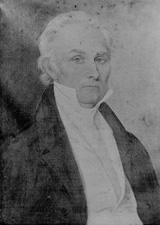Charles Tait
Charles Tait (* 1. February 1768 in Hanover County , Colony of Virginia ; † 7. October 1835 at Claiborne , Alabama ) was an American lawyer and politician ( Democratic-Republican Party ), of the state of Georgia in the US Senate took .
Charles Tait, who was born in what is now Hanover , moved with his parents to Georgia in 1783, where the family settled in Petersburg . As a young man he completed his education in 1787 at the Wilkes Academy , a private school in the city of Washington , and in 1788 on the Cokesbury College in Abingdon ( Maryland ) from.
At this college Tait was also active from 1789 to 1794 as a French lecturer. He studied during this time, moreover, the law and was admitted to the Bar Association of Georgia 1795th He was then until 1798 a member of the faculty and temporarily also rector of the Richmond Academy in Augusta before he concentrated on the legal profession and practiced as a lawyer in Elbert County . From 1803 to 1809 he also served as the District Court Judge for the Western District of Georgia.
After the resignation of US Senator John Milledge on November 14, 1809, Charles Tait was elected as his successor. He retired on 27 November of the same year in the Congress and remained there for a re-election in 1813 until March 3, 1819. During this time he led, among other things, the chair of the Marine Committee ( Committee on Naval Affairs ). After retiring from the Senate, he moved to Wilcox County , Alabama. President James Monroe appointed him a federal district court judge for that state, which he remained from 1820 until his resignation in 1826. He then worked until his death as a planter on his country estate in Monroe County ; In 1828 he turned down a diplomatic mission in Great Britain that had been proposed to him .
Web links
- Charles Tait in the Biographical Directory of the United States Congress (English)
- Charles Tait in the database of Find a Grave (English)
| personal data | |
|---|---|
| SURNAME | Tait, Charles |
| BRIEF DESCRIPTION | American lawyer and politician |
| DATE OF BIRTH | February 1, 1768 |
| PLACE OF BIRTH | Hanover County , Virginia |
| DATE OF DEATH | October 7, 1835 |
| Place of death | near Claiborne , Alabama |

